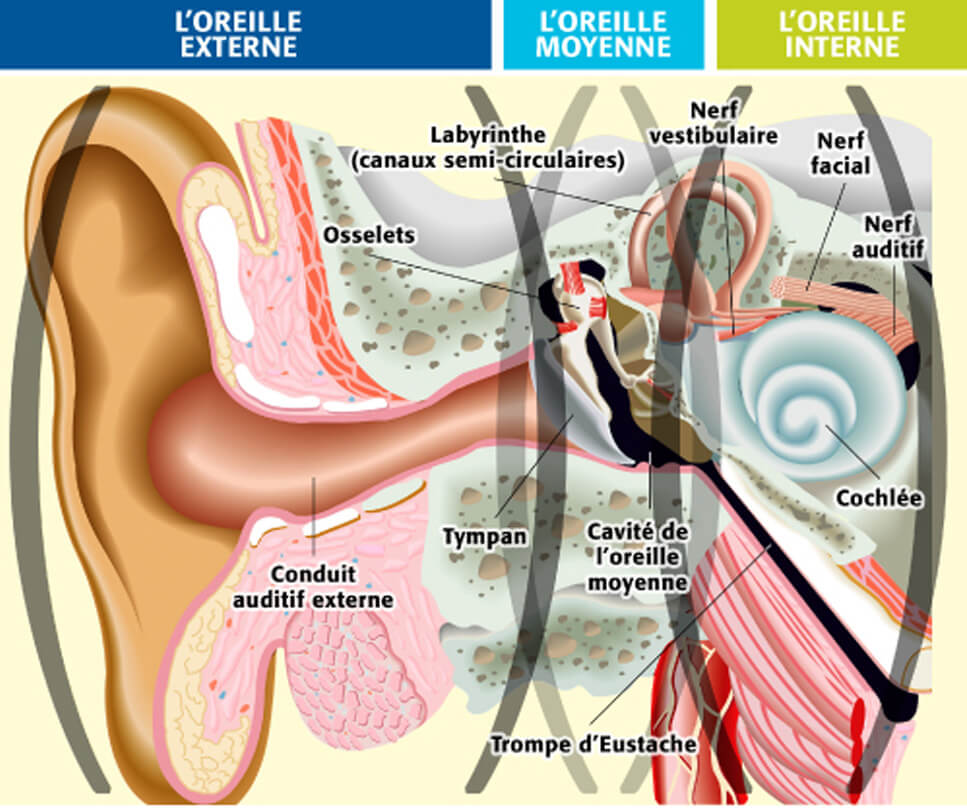
Tinnitus: A Major Scientific Breakthrough
Translated transcription of a speech given by Matthieu J. Guitton, researcher and professor at Laval University’s Faculty of Medicine, before the Association des malentendants du Québec (AMQ) on March 21, 2012.
 Translated transcription of a speech given by Matthieu J. Guitton, researcher and professor at Laval University’s Faculty of Medicine, before the Association des malentendants du Québec (AMQ) on March 21, 2012.
Translated transcription of a speech given by Matthieu J. Guitton, researcher and professor at Laval University’s Faculty of Medicine, before the Association des malentendants du Québec (AMQ) on March 21, 2012.
Tinnitus, or the perception of a noise in silence, is a major public health problem. In Western countries, it’s aggravated by the combination of an aging population and increasing noise pollution. Unfortunately, while the lives of people with tinnitus are greatly affected, there are currently no therapeutic strategies to help them. We simply don’t know enough about the biological mechanisms behind this condition. However, over the last decade, we have made great strides in our understanding of how tinnitus develops.
Since 2003, Mr. Guitton and his team of researchers in Québec, France and Israel have been provoking tinnitus in rats. This has shown them that tinnitus is related to the plasticity between the cilia in the inner ear and the neurons in the auditory nerve. By analyzing the data from their research, they have found that the biological bases and mechanisms behind tinnitus occur in two phases. The first phase involves a peripheral molecular component, and the second phase affects the entire auditory system.
There are many causes of tinnitus, like hearing loss, hyperacusis, prescription medication abuse and noise exposure. As a result, individuals may hear many types of sounds. Despite these differences, the end result is the same: a false message is sent through the auditory system. This suggests a shared biological foundation.
Given that most cases of tinnitus originate in the periphery of the inner ear, the cochlea, a crucial hearing organ, is of interest as a “tinnitus generator.” From this conclusion, two animal research protocols were developed. The first involved the injection of high doses of salicylate, a component of aspirin. The second involved overexposure to noise. Salicylate-induced tinnitus proved to be easily controllable. Once the salicylate was stopped, the tinnitus disappeared.
On the other hand, exposure to high noise levels creates long-term and generally irreversible tinnitus. Not all subjects, human or animal, developed tinnitus after exposure to loud noises. However, both research models helped us understand the mechanisms behind the first phase of tinnitus. The electrical transmission of nerve impulses between the cilia and the cochlea and the primary auditory neurons themselves have become areas of interest when it comes to initiating tinnitus. When observing the effects of salicylate on rats, an abnormal nervous signal was discovered. Salicylate inhibits an enzyme called cyclooxygenase, which increases arachidonic acid in the membranes of cochlear cilia. Certain glutamate receptors (NMDA) are particularly sensitive to the presence of this acid in the lipid composition of these cells’ membranes.
It’s true that tinnitus caused by medication is less common than that caused by noise exposure. However, the discovery of this mechanism showed us that the molecule used to treat the former could also be used to treat the latter. This treatment, which involves injecting an NMDA receptor antagonist into the endolymph of the cochlea, has proven to be 100% effective. That said, its effectiveness is time-sensitive. In rats, the treatment needs to be administered within four days of the appearance of tinnitus. It can be extrapolated that in humans, the treatment can be effective in the first six months following the appearance of tinnitus.
This discovery is very promising. The first phases of scientific approval have been conclusive, so human testing has been approved by the American Food and Drug Administration (FDA). We will need to wait to see if there are any side effects to this treatment before it can be applied to everyone living with tinnitus.
Another conclusion that can be drawn is that tinnitus is exclusively a physiological phenomenon. The accompanying anxiety is caused by tinnitus, not the other way around. Anxiety cannot cause tinnitus, but it can make it worse. This is why anti-anxiety medication can bring some relief.
As for people who have had tinnitus for longer, the sounds could become encoded in their sensory memory and, according to current knowledge, be irreversible. Various behavioural programs have been developed to help people living with chronic tinnitus to free themselves from isolation and improve their quality of life. There are better days ahead for all tinnitus sufferers.
Advice
For more information, ask a hearing health professionnal practicing in a Lobe clinic by calling 1 866 411-LOBE (5623).

